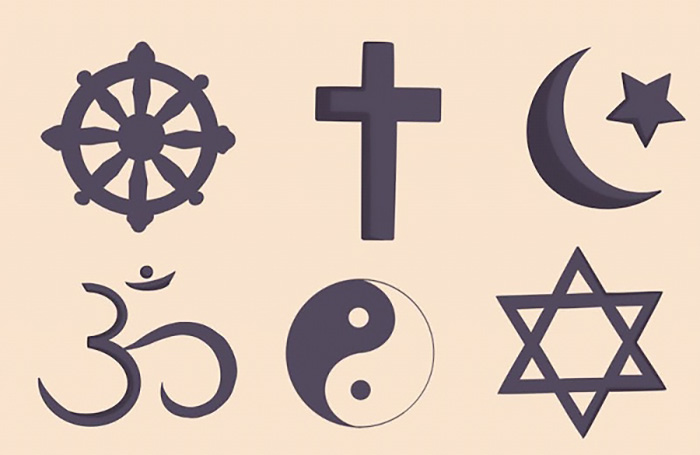Religion – by Goolbai Gunasekara
Source : island
To quote. “Religion should be the motor of life, the central heating plant of personality, the faith that gives joy to activity, hope to struggle, dignity to humility and zest to living.” Upliftment is the keynote. Yet Religion has been the cause of the most appalling bloodshed and strife. The most horrendous wars have been fought in the name of religion and rivers of blood have flowed while idiots quarreled over the words of god-like men who must have been appalled by the distortion of their messages to humanity. So let us agree that religion DIVIDES and most certainly does not UNITE.
I am at a loss, therefore, to understand WHY our education planners insist on religion being taught in schools? Religion continues to be a divider even in our little island. In schools that contain pupils of all faiths, students are split up whenever it is time for that period in religion. Language is already a divisive factor yet we purposely add yet another subject to compound the folly.
Of course, ethical values should be imparted to children but isn’t that a parent’s responsibility? In my frequently voiced (but usually ignored) opinion, it seems worthwhile to look for some unifying beliefs where children can sit together as a class and not be separated into Buddhist, Christian, Islam and Hindu groups for classes in religion.
This stupidity is worsened by religion being made a compulsory subject for the GCE O/L exam. The rising crime rate in Sri Lanka proves beyond a doubt that the teaching of religion in schools has been a COMPLETE failure. At the moment there is a desecration of public morality, and that is frightening.
How long can any society hold back these murky layers before there is an outpouring of grief, remorse and public SHAME? Certainly, no religious belief has helped. So, is there anything to be done about this overwhelmingly sorry mess?
Let us go back to a time over a century and a quarter ago, when Colonel Olcott, the accepted re-activator of Buddhism (a dedicated Theosophist) visited Sri Lanka in 1878 and founded over 460 BTS (Buddhist Theosophical Schools )which included schools like Ananda College, Musaeus College, Dharmaraja College and others. To the uninitiated, THEOSOPHY (a movement begun in 1875) seeks “to reconcile ALL Religions, Sects and Nations under a common system of ethics based on eternal verities”.
The Theosophical movement swept India and to this day its Headquarters exists on a 200-acre estate in Chennai with branches all over the world. During the time of Prime Minister Nehru, he, and many of his cabinet, were greatly influenced by Theosophy and by Madam Annie Besant, the great British lady, who fought for Indian nationalism. (Musaeus College has a Besant House in her memory). As President of the Theosophical Society she greatly influenced world thinking and certainly influenced Anaragika Dharmapala, who was with her at the World Congress of Religions in the USA in 1893.
Some great Theosophists included men like Thomas Edison, Aldous Huxley, William Butler Yeats, T. S. Elliot, Arthur Conan Doyle, to name a few. They accepted, as all Theosophists do, that one’s religion can remain comfortably in place while Theosophy adds depth and breadth to existing beliefs.
Both my parents were Theosophists. In fact, they were introduced as penfriends through the Theosophical Societies of the USA and India. My mother came from a Christian Theosophist family in the USA and my father was a Hindu Theosophist from India. I was brought up in whatever religion was at hand. I studied Christianity at the Ooty convent where, to my parents’ unflattering surprise, I managed to win the Catechism prize. Hinduism in my Jaffna school was fascinating and I quickly picked up the Hindu prayers and sang lustily at school Assembly without understanding a word of what I was singing! I learnt Buddhism for the short time I was at a Buddhist school and Theosophical beliefs at home from both my parents. In short, I had not declared religion until I was an adult and opted for Christianity because, truth to tell, I was most comfortable in a Church, which conducted services in English.
As a Theosophist I saw no great disparity between religions that could not be explained intellectually. I will not debate this attitude although many have tried. The Right Rev. Swithin Fernando, Bishop of Colombo, fully understood me and saw no reason for me not to accept belief in rebirth and other Buddhist teachings as a Christian. He was a great and liberal Bishop.
Now here Sri Lankans stand, divided as a nation by religion, by race, by caste, by class … even by gender. Let me enumerate some of the disasters we brought upon ourselves from the time of Independence. Only 22 million people comprise our population and yet we cannot manage our own affairs properly
1. A foolish language policy caused the Burghers to leave the country. Sri Lanka lost an educated and cultured people. (A highly attractive race too!)
2. An unnecessary act of nepotism caused SWRD Bandaranaike to leave the UNP and start his own party.
3. The Sinhala in 24 hours act ruined our education. We could have followed India’s example and handled the issue tactfully and slowly.
4. The Sri Lankan Civil Service was scrapped and we lost a body of fine men trained in the art of government who served whichever government was in power without fear or favour.
5. Free education was introduced at UNIVERSITY LEVEL despite much advice by experts not to offer WHAT EVEN WEALTHY COUNTRIES DID NOT OFFER. Better methods for tertiary education were suggested to allow talented but poorer students to get a university education so that only the deserving best got a higher education. What do we have today? Undeserving students that cost our economy what we cannot afford. I speak particularly of that egregious quota system.
A highly valuable comment was made by Dr Harini Amarasuriya, who, in a radio interview recently, spoke of a new vision for universities, where the first task will be to build up a superb teaching class who will not only match foreign professors but will have a high status also. This vision will be understood by our citizens if it is explained to them and undertaken by an honest government.
6. We boast of our literacy, but our schools have declined from being among the best in the world to being among the worst.
7. Politicians today are a far cry from our first Cabinet whose members were honourable men and financially incorruptible.
8. Earlier in the day Buddhist monks were not involved in government affairs. They are a sorry lot these days (with exceptions of course.)
9. I am not versed in the Constitution. Is anyone? But am I correct in assuming that JR’s constitution messed us up?
10. And last on this sorry list was the folly in forcing farmers to switch to organic fertiliser too hurriedly. Are we surprised that Sri Lanka is bankrupt?
To get back to religion, I can think of nothing better than following a system where ALL students in ALL Sri Lankan schools follow the SAME classes in VALUE EDUCATION as opposed to classes in religion. It is the title I gave to the study of Ethics and Ethical behaviour for school children. And, as I said before, let PARENTS UNDERTAKE THEIR OWN RESPONSIBILITIES of religion without passing it on to the school.
Thanks to my family’s Theosophist-oriented background, my daughter was able to have syllabuses ready for teaching the subject up to Grade Nine. When I was Principal of Asian International School, Value Education was taught for many years thanks to her. Both children and approving parents loved the classes.
I have a further comment which may not be a popular one. I accept that many of my comments are not! As a Principal, I noticed a sad thing. Muslim, Hindu and Christian children were well tutored at home in religious thought and regular religious practices. Hindu children would come to school quite often with Holy Ash on their foreheads after their morning prayers. Muslim children had special permission to leave school an hour earlier on Fridays to attend Mosque which they were keen to do. Most Christian students went to Sunday school and of course weekly Churchgoing AS A FAMILY was the norm.
But I regretfully say that such regular instruction and observances were NOT always part of the Buddhist children’s life. Instruction from parents was sporadic. A few of my seniors told me they rarely had any discussion or family observances from parents. In fact, they rarely went to temple. “No time,” said one. “No interest,” said another. “I don’t think my father EVER goes,” said a third. “My grandmother takes me occasionally,” said a fourth.
So, all those students received were those few periods of religion taught in school by teachers not specially trained to teach it. The appalling example set by many Buddhist priests does not inspire respect in junior minds. Need I labour the point?
It is a national tragedy that many of our children have no proper access to these means of deliverance that all religions propound and which have now resulted in a spiraling Sri Lankan crime rate that is among the highest in the world.
I conclude with one of my favourite quotes, “To those who wish to attain a State of Grace it is vital for them to seek out the route to attain it.”






